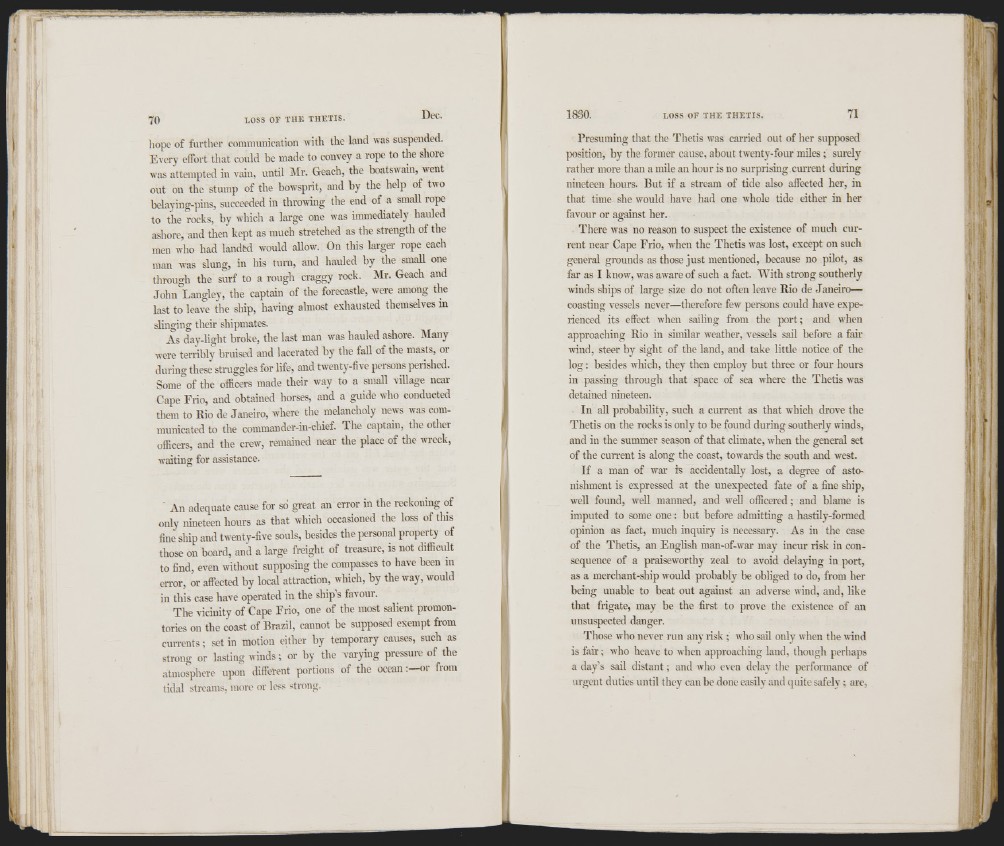
70 LOSS OF THE THETIS. Dec.
». ‘ 'i
liopo of fuvtlicr comnuinication with the land was suspended.
Everv effort that could be made to convoy a rope to the sliore
was attempted in vain, until Ur. Geach, the boatswain, went
out on the stump of the bowsprit, and by the help of two
belaying-pins, succeeded in throwing the end of a small rope
to the rocks, by which a large one was immediately hauled
ashore, and tlien kept as much stretched as the strength oi the
men who had landed wonld allow. On this lai'ger rope each
man was slung, in his turn, and hauled by the small one
through the siirf to a rough craggy rock. IMr. Geach and
John "Langley, the captain of the forecastle, were among the
last to leave the ship, having almost exhausted themselves in
slinging their shipmates.
As day-light broke, the last man was hauled ashore. IMany
were terribly bruised and lacerated by the fall of the masts, or
during thes^ struggles for life, and twenty-five persons perished.
Some"of the officers made their way to a small village near
Cape Frio, and obtained horses, and a guide who conducted
them to Rio de Janeiro, where the melancholy news was communicated
to the connnander-in-cliief. The captain, the other
officers, and the crew, remained near the place of the wreck,
waiting for assistance.
An adequate cause for sd great an error in the reckoning of
only mneteen hours as that which occasioned the loss of this
fin^ ship and twentv-five souls, besides the personal property of
those on board, and a large freight of treasure, is not difficult
to find, even without supposing the compasses to have lieen ra
error, or affected by local attraction, which, by the way, would
in this case have operated in the ship’s favour.
The vicinity of Cape Frio, one of the most salient promontories
on the coast of Brazil, cannot be supposed exempt from
cuiTents; set in motion either by temporary causes, such as
strong or lasting winds; or by the varying pressure of the
atmosphere upon different portions of the o c e a n o r from
tidal streams, moro or less strong.
1830. LOSS OF THE THETIS.
Presuming that the Thetis was carried out of her supposed
position, by the former cause, about twenty-four miles ; surely
rather more than a mile an hour is no surprising current during
nineteen hours. But if a stream of tide also affected her, in
that time she would have had one whole tide either in her
favour or against her.
There wais no reason to suspect the existence of much current
near Cape Frio, when the Thetis was lost, except on such
general grounds as those just mentioned, because no pilot, as
far as I know, was aware of such a fact. AVith strong southerly
winds ships of large size do not often leave Rio de Janeiro—
coasting vessels never—therefore few persons could have experienced
its effect when sailing from the p o rt; and when
approaching Rio in similar weather, vessels sail before a fair
wind, steer by sight of the land, and take little notice of the
lo g ; besides which, they then employ but tlii-ee or four hours
in passing through that space of sea where the Thetis was
detained nineteen.
In all probability, such a current :is that which drove the
Thetis on the rocks is only to he found during southerly winds,
and in the summer season of that climate, when the general set
of the current is along the coast, towards the south and west.
If a man of war is accidentally lost, a degree of astonishment
is expressed at the unexpected fate of a fine ship,
well found, weU manned, and well officered; and blame is
imputed to some one: but before admitting a hastily-formed
opinion as fact, much inquiry is necessarj-. As in the case
of the Thetis, an Englisli man-of-war may incur risk in consequence
of a praiseworthj' zeal to avoid delaying in port,
as a merchant-ship would probably be obliged to do, from her
being unable to beat out against ;m adverse wind, and, like
that frigate, may be the first to prove the existence of an
unsuspected danger.
Those who never run any risk ; who sml only when the wind
is fair; who heave to when approaching laud, though perhaps
a day's sail distant; and who even delay the performance of
urgent duties until they can be done easily and quite safely ; are,
( .
1 :
‘ ii'